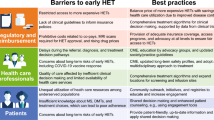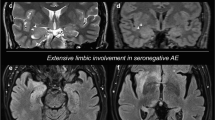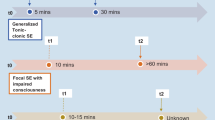Abstract
Objective
The main syndrome of anti-N-methyl-d-aspartate receptor encephalitis (NMDARE) is well-characterized, however, the difference in main symptoms between the initial episode and relapses and patient-oriented long-term outcomes has not been previously described.
Methods
To investigate the difference in syndrome symptoms between episodes and patient-oriented outcomes, we administered a structured questionnaire survey for the patients with anti-NMDARE or their family members. From the answers, we analyzed the frequency of main symptoms (e.g., prodromes, abnormal behaviors, memory deficit, speech disorders, involuntary movements, hypo-ventilation) between episodes and patient-oriented outcomes that included the recovery rate for return to previous work or school.
Results
Fifty-six patients were enrolled, and 14 (25%) showed clinical relapse. Details of symptoms at relapse were obtained from 11 patients. Prodrome (27% vs. 96%, p < 0.001), decreased level of consciousness (55% vs. 88%, p = 0.021), seizures (36% vs. 77%, p = 0.012), and involuntary movements (27% vs. 84%, p < 0.001) were significantly less frequent at relapse than initial episode. Although 80% (35/44) of the patients achieved favorable long-term outcomes (modified Rankin Scale score, 0–2), only 61% (27/44) returned to their previous work or school life.
Conclusion
Anti-NMDARE can relapse with milder and more limited symptoms than those of initial episode, and some patients did not return to their previous activities even after achieving a neurologically favorable outcome.



Similar content being viewed by others
Data availability
Not applicable.
Code availability
Not applicable.
References
Dalmau J, Tuzun E, Wu HY, Masjuan J, Rossi JE, Voloschin A et al (2007) Paraneoplastic anti-N-methyl-D-aspartate receptor encephalitis associated with ovarian teratoma. Ann Neurol 61:25–36. https://doi.org/10.1002/ana.21050
Dalmau J, Armangué T, Planagumà J, Radosevic M, Mannara F, Leypoldt F et al (2019) An update on anti-NMDA receptor encephalitis for neurologists and psychiatrists: mechanisms and models. Lancet Neurol 18:1045–1057. https://doi.org/10.1016/s1474-4422(19)30244-3
Graus F, Titulaer MJ, Balu R, Benseler S, Bien CG, Cellucci T et al (2016) A clinical approach to diagnosis of autoimmune encephalitis. Lancet Neurol 15:391–404. https://doi.org/10.1016/s1474-4422(15)00401-9
Dalmau J, Lancaster E, Martinez-Hernandez E, Rosenfeld MR, Balice-Gordon R (2011) Clinical experience and laboratory investigations in patients with anti-NMDAR encephalitis. Lancet Neurol 10:63–74. https://doi.org/10.1016/s1474-4422(10)70253-2
Irani SR, Bera K, Waters P, Zuliani L, Maxwell S, Zandi MS et al (2010) N-methyl-d-aspartate antibody encephalitis: temporal progression of clinical and paraclinical observations in a predominantly non-paraneoplastic disorder of both sexes. Brain 133:1655–1667. https://doi.org/10.1093/brain/awq113
Viaccoz A, Desestret V, Ducray F, Picard G, Cavillon G, Rogemond V et al (2014) Clinical specificities of adult male patients with NMDA receptor antibodies encephalitis. Neurology 82:556–563. https://doi.org/10.1212/wnl.0000000000000126
Florance NR, Davis RL, Lam C, Szperka C, Zhou L, Ahmad S et al (2009) Anti-N-methyl-D-aspartate receptor (NMDAR) encephalitis in children and adolescents. Ann Neurol 66:11–18. https://doi.org/10.1002/ana.21756
Titulaer MJ, McCracken L, Gabilondo I, Armangué T, Glaser C, Iizuka T et al (2013) Treatment and prognostic factors for long-term outcome in patients with anti-NMDA receptor encephalitis: an observational cohort study. Lancet Neurol 12:157–165. https://doi.org/10.1016/s1474-4422(12)70310-1
Gabilondo I, Saiz A, Galan L, Gonzalez V, Jadraque R, Sabater L et al (2011) Analysis of relapses in anti-NMDAR encephalitis. Neurology 77:996–999. https://doi.org/10.1212/WNL.0b013e31822cfc6b
Narayanaswami P (2017) The spectrum of functional rating scales in neurology clinical trials. Neurotherapeutics 14:161–175. https://doi.org/10.1007/s13311-016-0488-5
Iizuka T, Sakai F, Ide T, Monzen T, Yoshii S, Iigaya M et al (2008) Anti-NMDA receptor encephalitis in Japan: long-term outcome without tumor removal. Neurology 70:504–511. https://doi.org/10.1212/01.wnl.0000278388.90370.c3
van Swieten JC, Koudstaal PJ, Visser MC, Schouten HJ, van Gijn J (1988) Interobserver agreement for the assessment of handicap in stroke patients. Stroke 19:604–607. https://doi.org/10.1161/01.str.19.5.604
Hara M, Martinez-Hernandez E, Ariño H, Armangué T, Spatola M, Petit-Pedrol M et al (2018) Clinical and pathogenic significance of IgG, IgA, and IgM antibodies against the NMDA receptor. Neurology 90:e1386–e1394. https://doi.org/10.1212/wnl.0000000000005329
Nicolle DCM, Moses JL (2018) A systematic review of the neuropsychological sequelae of people diagnosed with anti N-methyl-D-aspartate receptor encephalitis in the acute and chronic phases. Arch Clin Neuropsychol 33:964–983. https://doi.org/10.1093/arclin/acy005
de Bruijn M, Aarsen FK, van Oosterhout MP, van der Knoop MM, Catsman-Berrevoets CE, Schreurs MWJ et al (2018) Long-term neuropsychological outcome following pediatric anti-NMDAR encephalitis. Neurology 90:e1997–e2005. https://doi.org/10.1212/wnl.0000000000005605
Binks SNM, Veldsman M, Easton A, Leite MI, Okai D, Husain M, Irani SR (2021) Residual fatigue and cognitive deficits in patients after leucine-rich glioma-inactivated 1 antibody encephalitis. JAMA Neurol 78:617–619. https://doi.org/10.1001/jamaneurol.2021.0477
Cella D, Lai JS, Nowinski CJ, Victorson D, Peterman A, Miller D et al (2012) Neuro-QOL: brief measures of health-related quality of life for clinical research in neurology. Neurology 78:1860–1867. https://doi.org/10.1212/WNL.0b013e318258f744
Asaithambi G, Tipps ME (2020) Quality of life among ischemic stroke patients eligible for endovascular treatment: analysis of the DEFUSE 3 trial. J Neurointerventional Surg. https://doi.org/10.1136/neurintsurg-2020-016399
Iizuka T, Kaneko J, Tominaga N, Someko H, Nakamura M, Ishima D et al (2016) Association of progressive cerebellar atrophy with long-term outcome in patients with anti-N-methyl-d-aspartate receptor encephalitis. JAMA Neurol 73:706–713. https://doi.org/10.1001/jamaneurol.2016.0232
Balu R, McCracken L, Lancaster E, Graus F, Dalmau J, Titulaer MJ (2019) A score that predicts 1-year functional status in patients with anti-NMDA receptor encephalitis. Neurology 92:e244–e252. https://doi.org/10.1212/WNL.0000000000006783
Acknowledgements
We sincerely thank all patients and their families. We also acknowledge the Japanese anti-NMDARE patients’ associations for providing the data from postal questionnaires sent to patients or patients’ families.
Funding
This work was supported in part by MHLW Grant Number 19HA1002 (Makoto Hara).
Author information
Authors and Affiliations
Contributions
Study concept and design: SH, MH, SK and HN. Drafting of the manuscript: SH. Acquisition of data: SH, SK and HN. Analysis and interpretation of data: all authors. Critical revision of the manuscript for important intellectual content: MH, JD and HN. Study supervision: MH, SK and HN. All authors approved the final version of this work.
Corresponding author
Ethics declarations
Conflicts of interest
Josep Dalmau receives royalties from Athena Diagnostics for the use of Ma2 as an autoantibody test and from Euroimmun for the use of NMDA receptor, GABAB receptor, GABAA receptor, DPPX and IgLON5 as autoantibody tests. Satoshi Hirose, Makoto Hara, Satoshi Kamei and Hideto Nakajima report no disclosures relevant to the manuscript.
Ethical approval
This study was approved by the ethics committee of the Nihon University School of Medicine.
Consent to participate
Written informed consent for participation was obtained from the patients or their family members.
Consent for publication
Written informed consent for participation was obtained from the patients or their family members.
Supplementary Information
Below is the link to the electronic supplementary material.
Rights and permissions
About this article
Cite this article
Hirose, S., Hara, M., Kamei, S. et al. Characteristics of clinical relapses and patient-oriented long-term outcomes of patients with anti-N-methyl-d-aspartate receptor encephalitis. J Neurol 269, 2486–2492 (2022). https://doi.org/10.1007/s00415-021-10828-8
Received:
Revised:
Accepted:
Published:
Issue Date:
DOI: https://doi.org/10.1007/s00415-021-10828-8




